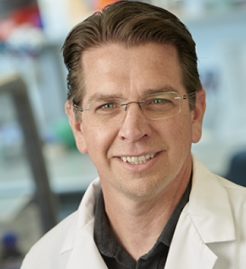
David Engelthaler is the Co-Director and Associate Professor of Pathogen Genomics Division at TGen North. TGen North focuses on pathogen genomics with a specific mission to advance clinical medicine, public health and biodefense. Dave is also the Executive Director of the Southwest One Health Collaborative, Director of the TGen North Clinical Laboratory and Co-Director of the AZ COVID-19 Genomics Union. Dave has overseen the rapid development of TGen’s FDA-allowed COVID-19 diagnostics tests, the standing up of a federally-licensed COVID diagnostic laboratory, and the institution of the AZ COVID sequencing reference laboratory - all in support of the Arizona’s public health and healthcare response. Dave is also overseeing or participating in multiple COVID research projects, from assessing the impact of COVID on HIV populations, to providing testing for clinical trials of new drugs, to environmental analyses.
Just prior to the COVID-19 pandemic, Dave was overseeing research projects involving advancing our understanding of multi drug resistant infections; development of novel genotyping techniques for genomic epidemiology and microbial forensics; fungal epidemiology and phylogenetics; and more. A major focus of this works involves adapting and advancing the use of next-generation sequencing tools for infectious disease research and health care. Dave also oversees the application of the above research in real-life disease outbreak investigations, both natural and man-made. Recently, Dave led investigations involving invasive group A Strep in the Southwest, Cryptococcosis emergence in the Pacific Northwest, a multi-state fatal fungal meningitis outbreak associated with contaminated medical products and many other disease investigations.
Dave is leading teams that have developed revolutionary techniques to detect extremely low-level subpopulations of resistant Mycobacterium tuberculosis in patients, weeks to months before current tests can detect resistance. Similar approaches are being applied to develop a next generation of test for hospitals and clinicians to rapidly identify critical multi-drug resistant organisms that result in tens of thousands of deaths in the US every year.
